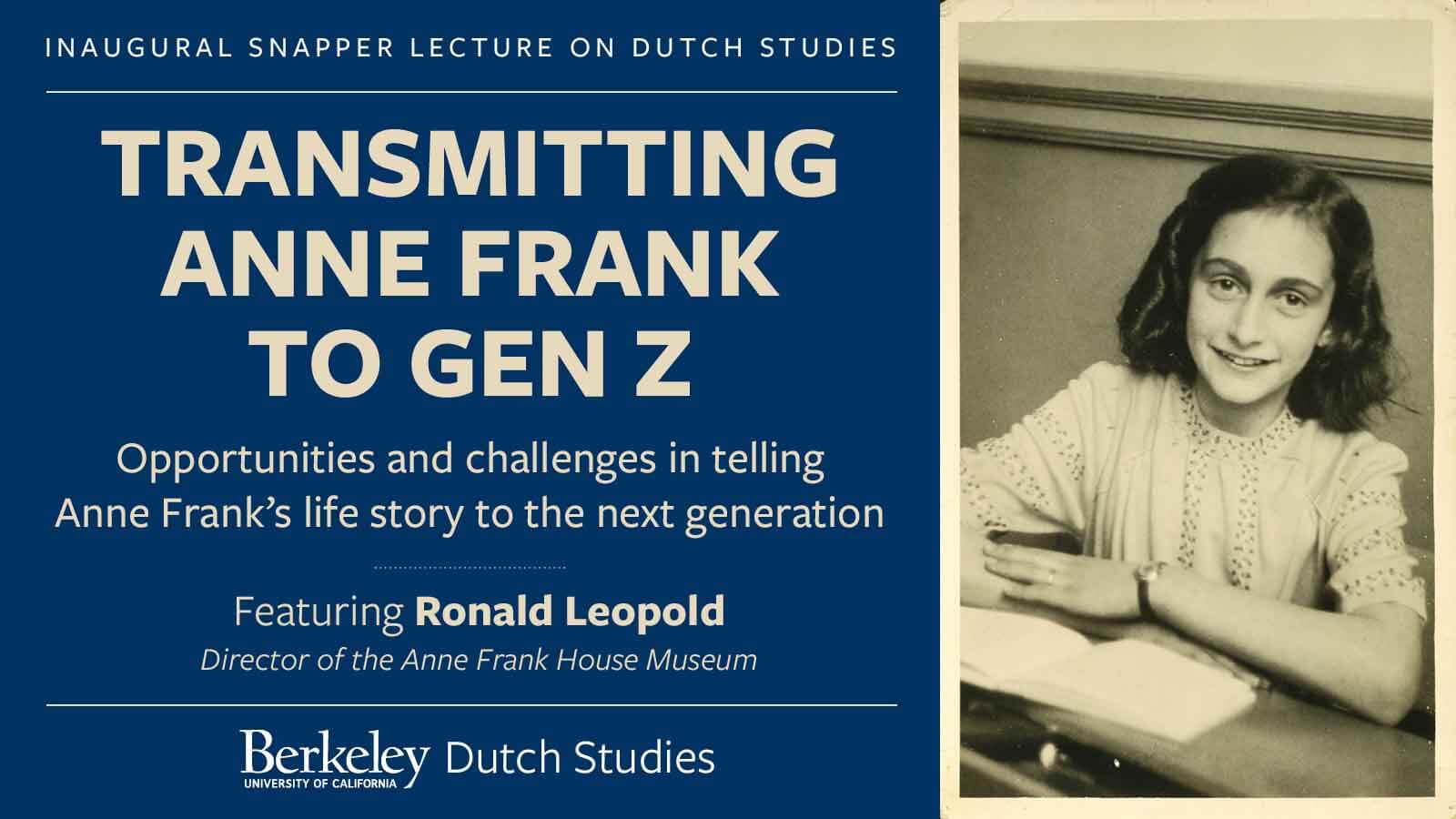
- This program has passed.
Transmitting Anne Frank to Gen Z
Nov 15, 2023 @ 5:00 pm - 7:00 pm

Presented by UC Berkeley Dutch Studies
in partnership with The Magnes Collection of Jewish Art and Life and Berkeley’s Center for Jewish Studies.
Join us for the Inaugural Snapper Lecture on Dutch Studies, Transmitting Anne Frank to GenZ: Opportunities and challenges in telling Anne Frank’s life story to the next generation featuring Ronald Leopold, the Director of the Anne Frank House.
Wednesday, November 15, 2023 | 5:00 – 7:00 pm
Welcome reception with lecture to follow
In person at The Magnes Collection, 2121 Allston Way, Berkeley, CA
This lecture is made possible by the Johan Snapper Endowment for Dutch Studies in recognition of the program’s founder Professor Emeritus Johan Snapper
Almost 80 years after her tragic death in concentration camp Bergen-Belsen, Anne Frank still figures prominently in the public domain. Over the years, her diary and her life story have been the subject of an expansive output of adaptations and engagements, giving her an iconic status. While there is an unabated interest in Anne Frank, new generations connect to her on their own terms and within their own, rapidly changing, media landscape. It poses a challenge to us to open up to their worlds and to find new ways to tell the story of Anne Frank.
RSVPSpace is limited. Registration will close once capacity is reached.
If you have any questions about accessibility or require accommodations to participate in this event, please contact us at magnes@berkeley.edu or call us at (510) 643-2526 with as much advance notice as possible.
About Ronald Leopold
 Director of the Anne Frank House Museum
Director of the Anne Frank House Museum
Ronald Leopold graduated in 1985 with a degree in history from the University of Groningen, in the Netherlands. After his studies, he worked at the General Pension Fund for Public Employees, where he was responsible for the implementation of legislation affecting war victims. In 1990 he moved to the Pensions and Benefits Council, which he directed from 2006. In 2011, he assumed the Directorship of the Anne Frank House.
About Johan P. Snapper
 Em. Queen Beatrix Professor in Dutch Studies
Em. Queen Beatrix Professor in Dutch Studies
Professor Snapper did his Graduate work in Germanic languages and literatures at the University of Chicago (M.A.) and the University of California at Los Angeles (Ph.D.). He specializes in eighteenth-century German literature and modern Netherlandic literature. In addition to his doctoral dissertation (on Friedrich Maximilian Klinger) his publications include six books and more than fifty scholarly articles. One of his monographs deals with the work of the controversial Dutch writer Gerard Reve, while his most recent study (The Ways of Marga Minco) is a book on the Dutch writer Marga Minco, best known for her novels and short stories on the Jewish persecution in the Netherlands. Professor Snapper is on the Editorial Board of a number of publications, including the Publications of the American Association for Netherlandic Studies (PAANS), the Canadian Journal of Netherlandic Studies (CJNS) and De Nederlandse Taal. Among national and international offices he has held are the presidency of the American Association for Netherlandic Studies, membership on the executive board of the International Association for Netherlandics (IVN), and the chair of the Netherlands International Commission on Higher Education for Czechoslovakia, Hungary, and Rumania. He is also the organizer of eight international conferences on Dutch linguistics and literature and the founder of the Netherlands-America University League. For his scholarly and community service, Professor Snapper received a Congressional Citation of Merit (USA), and he has been knighted as Officer in the Order of Orange-Nassau (the Netherlands) and Officer in the Order of the Crown (Belgium). He also serves as the honorary consul of the Netherlands for northern California. Professor Snapper was presented with a Festschrift, Vantage Points, on the occasion of the 25th anniversary of the Queen Beatrix Chair.
About UC Berkeley Dutch Studies
The Dutch Studies Program at the University of California, Berkeley was introduced as a permanent curriculum in the Department of German in autumn 1966. Because the Berkeley campus already had strong offerings in Dutch history, art history, and colonial studies, the introduction of Dutch language and literature was the final step in completing a rounded interdisciplinary curriculum in Dutch Studies.
With the introduction of the Queen Beatrix Chair of Dutch Language, Literature & Culture in 1971, a degree Program in Dutch studies was launched, eventually leading to a Dutch Major. The first incumbent of the chair was Professor Johan Snapper, he was succeeded by Ernst van Alphen in 2004. Presently, Jeroen Dewulf holds the position.
In 1982 a second endowed chair was introduced, the Peter Paul Rubens Chair for Flemish Studies. It was the first Flemish chair endowed in the United States by the government of the Flemish Community in Belgium. This enrichment of the Dutch Studies Program allowed a significant expansion of its course offerings by the annual appointment of outstanding faculty from Flemish universities as visiting professor for a semester. Participating universities are the University of Antwerp, the Free University of Brussels, Ghent University, the University of Hasselt, and the Catholic University of Leuven.
In 2012, a PhD program in Dutch Studies was inaugurated, the Designated Emphasis in Dutch Studies.


